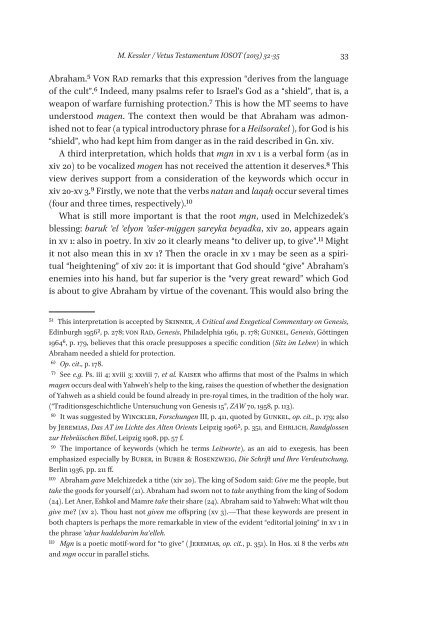Special Issue IOSOT 2013 - Books and Journals
Special Issue IOSOT 2013 - Books and Journals
Special Issue IOSOT 2013 - Books and Journals
You also want an ePaper? Increase the reach of your titles
YUMPU automatically turns print PDFs into web optimized ePapers that Google loves.
M. Kessler / Vetus Testamentum <strong>IOSOT</strong> (<strong>2013</strong>) 32-35 33<br />
Abraham.5 Von Rad remarks that this expression “derives from the language<br />
of the cult”.6 Indeed, many psalms refer to Israel’s God as a “shield”, that is, a<br />
weapon of warfare furnishing protection.7 This is how the MT seems to have<br />
understood magen. The context then would be that Abraham was admonished<br />
not to fear (a typical introductory phrase for a Heilsorakel ), for God is his<br />
“shield”, who had kept him from danger as in the raid described in Gn. xiv.<br />
A third interpretation, which holds that mgn in xv 1 is a verbal form (as in<br />
xiv 20) to be vocalized mogen has not received the attention it deserves.8 This<br />
view derives support from a consideration of the keywords which occur in<br />
xiv 20-xv 3.9 Firstly, we note that the verbs natan <strong>and</strong> laqaḥ occur several times<br />
(four <strong>and</strong> three times, respectively).10<br />
What is still more important is that the root mgn, used in Melchizedek’s<br />
blessing: baruk ʾel ʾelyon ʾašer-miggen ṣareyka beyadka, xiv 20, appears again<br />
in xv 1: also in poetry. In xiv 20 it clearly means “to deliver up, to give”.11 Might<br />
it not also mean this in xv 1? Then the oracle in xv 1 may be seen as a spiritual<br />
“heightening” of xiv 20: it is important that God should “give” Abraham’s<br />
enemies into his h<strong>and</strong>, but far superior is the “very great reward” which God<br />
is about to give Abraham by virtue of the covenant. This would also bring the<br />
5) This interpretation is accepted by Skinner, A Critical <strong>and</strong> Exegetical Commentary on Genesis,<br />
Edinburgh 19562, p. 278; von Rad, Genesis, Philadelphia 1961, p. 178; Gunkel, Genesis, Göttingen<br />
19646, p. 179, believes that this oracle presupposes a specific condition (Sitz im Leben) in which<br />
Abraham needed a shield for protection.<br />
6) Op. cit., p. 178.<br />
7) See e.g. Ps. iii 4; xviii 3; xxviii 7, et al. Kaiser who affirms that most of the Psalms in which<br />
magen occurs deal with Yahweh’s help to the king, raises the question of whether the designation<br />
of Yahweh as a shield could be found already in pre-royal times, in the tradition of the holy war.<br />
(“Traditionsgeschichtliche Untersuchung von Genesis 15”, ZAW 70, 1958, p. 113).<br />
8) It was suggested by Winckler, Forschungen III, p. 411, quoted by Gunkel, op. cit., p. 179; also<br />
by Jeremias, Das AT im Lichte des Alten Orients Leipzig 19062, p. 351, <strong>and</strong> Ehrlich, R<strong>and</strong>glossen<br />
zur Hebräischen Bibel, Leipzig 1908, pp. 57 f.<br />
9) The importance of keywords (which he terms Leitworte), as an aid to exegesis, has been<br />
emphasized especially by Buber, in Buber & Rosenzweig, Die Schrift und Ihre Verdeutschung,<br />
Berlin 1936, pp. 211 ff.<br />
10) Abraham gave Melchizedek a tithe (xiv 20). The king of Sodom said: Give me the people, but<br />
take the goods for yourself (21). Abraham had sworn not to take anything from the king of Sodom<br />
(24). Let Aner, Eshkol <strong>and</strong> Mamre take their share (24). Abraham said to Yahweh: What wilt thou<br />
give me? (xv 2). Thou hast not given me offspring (xv 3).—That these keywords are present in<br />
both chapters is perhaps the more remarkable in view of the evident “editorial joining” in xv 1 in<br />
the phrase ʾaḥar haddebarim haʾelleh.<br />
11) Mgn is a poetic motif-word for “to give” ( Jeremias, op. cit., p. 351). In Hos. xi 8 the verbs ntn<br />
<strong>and</strong> mgn occur in parallel stichs.








![Am HaSefer [Volk des Buches] - Books and Journals](https://img.yumpu.com/20648352/1/174x260/am-hasefer-volk-des-buches-books-and-journals.jpg?quality=85)







